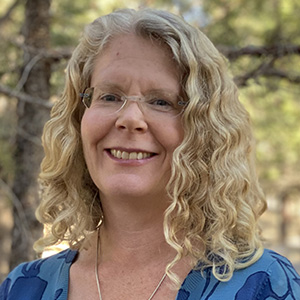Dr. Michelle Mack is a Regents’ Professor in the Department of Biological Sciences and the Center for Ecosystem Science and Society at Northern Arizona University in Flagstaff, AZ. She is an ecosystem ecologist who studies the impacts of climate and disturbances, such as wildfire and abrupt permafrost thaw, on the dynamics of Arctic and boreal ecosystems. She is the Director of the NSF-funded Boreal Long-Term Ecological Research Site in Fairbanks, Alaska. She is a Fellow of the Ecological Society of America and the American Geophysical Union and has contributed to scientific reports for policy makers and the public, such as the US National Climate Assessment. She graduated from the Evergreen State College in Olympia, Washington, with a concurrent BS-BA in Biology and Literature (1990) and received a PhD in Integrative Biology (1998) from the University of California-Berkeley.
Ecosystem dynamics in the face of disturbance are shaped by ecological memory: legacies of past ecosystems transmitted through carryover of information and materials that support recovery and stabilize ecosystem processes. In cold biomes, ecological memory can also include thermal legacies: time lags in energy flow and ecosystem structure that maintain thermal states of past climate. Over the past century, Alaska has been warming twice as quickly as the global average, with some of the largest air temperature increases occurring in its interior boreal forests. This warmer, drier climate has triggered unprecedented changes to regional disturbances such as wildfire, outbreaks of consumers, and permafrost thaw, eroding the material, informational, and thermal legacies that support ecosystem resilience. The Bonanza Creek (BNZ) LTER program is designed to address the following questions: 1) how do legacies constrain the response of the Alaskan boreal forest to climate change, 2) how will these legacies affect future ecosystem trajectories, and 3) what are the local, regional, and global impacts of these emergent ecosystem trajectories now and in the future? We are using multiple lines of evidence to test mechanistic hypotheses about the role of legacies in ecosystem resilience and change. Our technical approach combines continued collection of long-term data with data from new sites, experiments, and surveys that expand research to new axes of disturbance impacts. Our approach integrates statistical inference with process-based simulation modeling to predict current and future ecological dynamics and feedbacks at the landscape scale. Finally, we are working to identify social-ecological vulnerabilities and explore adaptation opportunities with Alaska Natives and Alaskan communities.

Support the people who manage our natural areas and protect biodiversity in perpetuity.